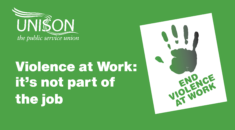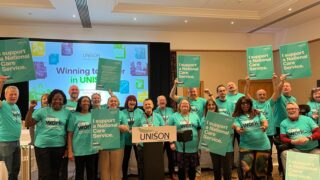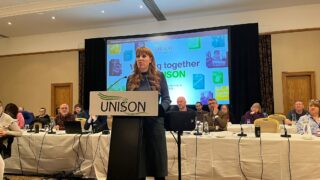“None of our members and colleagues go to work to be assaulted,” Tracy Hill told delegates at the UNISON Community service group conference this weekend.
Yet for far too many – 70% of housing association workers in a 12-month period, according to a recent BBC report – physical or verbal abuse is a daily reality.
“Employers say: ‘We didn’t know’,” Ms Hill told conference. “But it is not acceptable for them to wait until there is a physical or mental injury” to their staff.
That is why the conference agreed to launch a “Violence at Work Charter” which would see employers commit themselves to “a series of interventions” to reduce the number of violent incidents staff find themselves subject to.
This would include:
- collecting and monitoring data on violent incidents;
- proper structured support for staff who experience violence;
- thorough risk assessments when staff are placed in vulnerable situations;
- training for staff so they know how to deal with threatening situations.
- Many of these might seem obvious steps, but the importance of getting community employers to sign up to them was illustrated by one speaker.
When he was employed by the council, he explained, he was trained in “breakaway techniques” to stop confrontations turning violent. Now he works in the community sector, his employer says such training is only available after an assault has taken place.
UNISON plans to launch a pilot scheme to get employers to sign up to its charter on violence at work in the housing association sector later this year.
It would them be expanded, along with any lessons learned, to cover all employers in the housing, community and voluntary sectors.
And if, despite everything, workers are injured through violence at work, conference declared, then they should receive full support and proper sick pay.
After hearing that “some members face violence at work and suffer serious injury – and then have to suffer inadequate sick pay,” conference vowed to campaign for the “fundamental principle” that “no employee in the community sector should suffer a financial detriment as a result of injuries they have received in the course of their work.”







